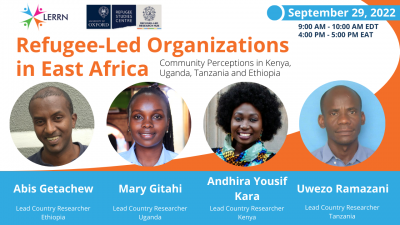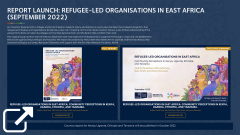Available in عربي Français Español
On September 29, the Local Engagement Refugee Research Network (LERRN) hosted a webinar to launch the report on Refugee-led Organizations (RLOs) in East Africa supported by LERRN and the Refugee-Led Research Hub (RLRH). The report and Executive Summary are available on the website of the Refugee-Led Research Hub. The webinar attracted 87 participants, bringing together scholars and practitioners from 16 countries. The four country-lead researchers – Andhira Yousif Kara, Abis Getachew, Mary Gitahi, and Uwezo Ramazani – presented key takeaways from the report.
Andhira Yousif Kara, the lead researcher in Kenya, kicked off the presentation by introducing a definition for Refugee-led Organizations. Within the framework of this research, the definition of RLOs included any organizations, associations, coalitions, formal or informal networks, faith-based groups, and initiatives led by refugees or asylum seekers in urban, rural, camp, and settlement settings. As these organizations function to respond to the needs of refugees, the organizations that operate fully for profit or do not include refugees in their key decision-making roles were excluded from the scope of this study.
Kara emphasized the lack of evidence on the impact of the RLOs in displaced communities. This research fills in this gap by looking at how RLOs are perceived in the communities where they work and by analyzing the factors that present challenges in their operations. A team of researchers affected by displacement conducted the research in two phases in 11 urban and camp/settlement sites across Ethiopia, Kenya, Tanzania, and Uganda. The mapping phase reviewed the literature, identified 178 RLOs, and included 151 rapid phone interviews with stakeholders to grasp the diversity of RLOs. The team selected 60 RLO leaders and 53 external stakeholders to interview. The team also conducted over 100 focus group discussions with RLO staff, volunteers, and beneficiaries. The 60 RLOs in the smaller sample were divided into three main stages of development depending on their funding capacities.
- The “self-help phase” where the organizations exist in informal groups and are not registered. They are dependent on membership contributions and may engage in small income-generating activities to support their community work. The research shows that most women-led organizations are found at this stage.
- The “growth phase” where RLOs are registered and provide services to their members and their broader communities (often along ethnic lines). Some of them receive funds from diasporic community members and humanitarian organization donors. At this stage, they look for local and international actors with whom they can partner and collaborate.
- The “expansion phase” includes Non-Governmental Organizations and other larger registered RLOs. They provide services to refugees regardless of ethnicity and also to the host community. They can access more funding through larger networks.
After this overview of the research methodology, Abis Getachew, the lead researcher in Ethiopia, explained the perceived impact of RLOs. As RLOs work closely with the communities they serve, their services are perceived by their beneficiaries as fairer, more accountable, and more accessible. Community members feel that they are treated with respect and dignity when they access support from RLOs. Their proximity to the community allows them to respond to emergencies, including outside of typical work hours. They are also known for their provision of livelihood support, such as micro-loans.
Getachew emphasized the importance of networks for RLOs. In countries such as Ethiopia and Tanzania where RLOs are not allowed to register with the government, they depend heavily on the diaspora for support and funding. In countries like Kenya and Uganda where there is government support, RLOs rely on NGO connections for funding. The structural barriers and self-censorship in all four countries affect women-led RLOs more severely, as they are more likely to remain at the self-help stage.
Uwezo Ramazani, the lead researcher in Tanzania, noted that the regulatory framework influences RLOs differently in each country. In Uganda and Kenya, RLOs can operate openly even if they are not registered, whereas in Tanzania and Ethiopia unregistered RLOs are unable to operate safely and experience challenges in opening bank accounts to receive funds. In all of the countries, registration is challenging for RLOs who have leaders with low literacy or education levels, or who lack networks with area Chiefs and refugee-supporting institutions. Restrictions on refugee movement also makes it difficult to develop organizations. Partnerships are important as they bring exposure to the work of RLOs and legitimize them to potential donors. The registered RLOs are more likely to access partnerships. However, Ramazani emphasized that larger organizations and international Non-Governmental Organizations are slow to provide funding or to transfer power in a meaningful way to refugees.
Finally, Mary Gitahi, the lead researcher in Uganda, offered recommendations to donors, governments, UNHCR, aid organizations, and RLOs. For example, Gitahi underlined that stakeholders should work toward meaningful and non-tokenistic ways to engage RLOs, while ensuring their independence. Donors, including states and philanthropic organizations, should prioritize direct funding to RLOs, including unregistered self-help groups led by marginalized refugees. Gitahi wrapped up the discussion by emphasizing that researchers affected by displacement can lead methodologically rigorous studies – such as this study – if provided with appropriate resources.
This substantial research project demonstrates the importance of RLO inclusion in global humanitarian activities and calls for further research on the impacts of RLOs. The study provides an extensive knowledge base that shows the diverse and valuable work of RLOs. The webinar raised important issues such as the regulatory differences between countries related to registration and restrictions, the barriers for women-led initiatives, the challenges of RLO-to-RLO partnerships, the power imbalance between international organizations and RLOs, the challenges of accessing funding, and the risks RLOs must manage in their work. The next step for this research is to widely disseminate the regional report and individual country reports to community members, government decision-makers, and beyond. Stay tuned for the launch of the report from the parallel study in the Middle East region!
This report was prepared by Irem Karabağ, LERRN Project Writer.

